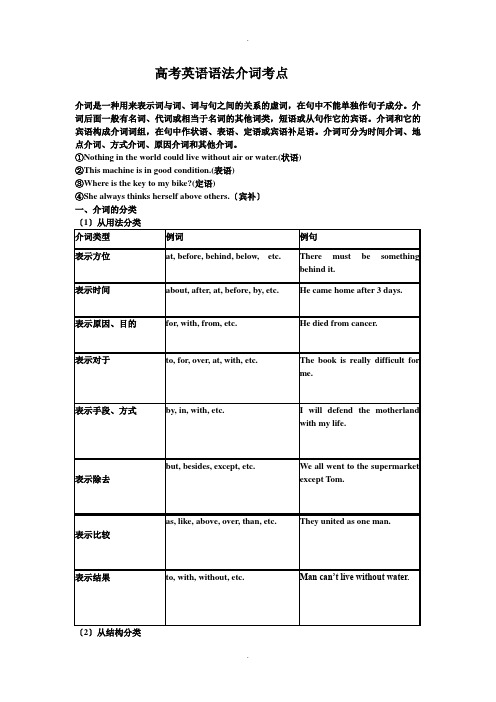高三英语高考难点讲解难点8亦有规律可循的介词
高考英语 复习资料之难点讲解大全难点 时隐时现的介词

落堕市安心阳光实验学校难点30 时隐时现的介词介词是短文改错中的一大考点,而介词又是难掌握的一种词类。
大多数介词都有多种用法,如介词at;不同的介词还可能有相似的用法如in the morning ,on Monday morning 等,而且介词的位置,介词和副词的区别,以及介词与连词的连用等都是学习中的难点也是高考中考查的热点。
●难点磁场1.(★★★★★) Evening came down. We spent the night in a hotel at the top of the mountain.83. ________ (NMET 2002)2.(★★★★) I won’t be able to come in this time. 87. ________ (2000春季)3.(★★★★★)We practise for three times every week and often watch football match on TV together.87. ________4.(★★★★★) Newly-published novels are always in great demand, and some books, for example, books for history.88. ________5.(★★★★★) The wild beast took no notice of her and went into the bedroom which he fell asleep on the carpet.84. ________ (模拟题)●案例探究1.I was so tired that I fell asleep at the moment my head touched the pillow.(NMET 2002)解析:此题为五星级题。
去掉at。
高三英语介词知识点总结

高三英语介词知识点总结英语中的介词是一类虚词,常用来表示位置、方向、时间、原因、方式等概念。
熟练掌握介词的用法对于提高语言表达能力至关重要。
下面就是我对高三英语介词知识点的总结:一、位置和方向介词1. in:表示在某个范围之内,如in the room(在房间里),in the park(在公园中)。
2. on:表示在某个表面上,如on the table(在桌子上),on the wall(在墙上)。
3. at:表示在某个具体的位置,如at the bus stop(在公交车站),at the corner(在拐角处)。
4. under:表示在某物的下方,如under the bed(在床下),under the tree(在树下)。
5. behind:表示在某物的后面,如behind the door(在门后),behind the building(在建筑物后)。
6. in front of:表示在某物的前面,如in front of the house(在房子前面),in front of the school(在学校前面)。
7. next to:表示在某物的旁边,如next to the window(在窗户旁边),next to the car(在车旁边)。
二、时间介词1. at:表示在某个具体的时间点,如at 7 o'clock(在7点钟),at lunchtime(在午餐时间)。
2. on:表示在某一天或特定日期,如on Monday(在星期一),on December 25th(在12月25日)。
3. in:表示在某一段时间或月份,如in the morning(在早上),in October(在十月)。
4. during:表示在某个时间段内,如during the summer(在夏天期间),during the meeting(在会议期间)。
三、原因和方式介词1. because of:表示因为某个原因,如because of the rain(因为下雨),because of my bad health(因为我的身体状况不好)。
英语介词高考知识点汇总

英语介词高考知识点汇总介词在英语中是一个重要的词类,也是高考中的重点考察内容。
正确运用介词可以使语言表达更加准确、流畅。
下面,我们来从不同的角度总结一些高考中常见的介词知识点。
一、基本介词用法1. 表示时间:- at:在具体的点或某一特定时间(如at 6 o'clock,在 6 点钟)。
- on:在某天、日期或具体的节日(如on Monday,在星期一;on Christmas,在圣诞节)。
- in:在一段时间之内(如in the morning,在早晨;in May,在五月)。
2. 表示地点:- in:在大范围区域(如in Beijing,在北京)。
- on:在小范围区域的表面(如on the table,在桌子上)。
- at:在具体的点或某一特定位置(如at the bus stop,在公交车站)。
3. 表示方式、原因、目的等:- for:表示对某人或某事有利(如good for health,有益于健康)。
- by:通过某种方式或手段(如by bus,乘坐公交车;by the way,顺便说一下)。
- with:伴随某物或某人一起(如play with friends,和朋友一起玩)。
4. 表示动作的方向或位置:- to:表示朝着某处(如go to school,去学校)。
- from:表示从某处来(如come from China,从中国来)。
- into:表示进入某处(如go into the room,进入房间)。
5. 表示从属关系:- of:表示所属关系(如a friend of mine,我的一个朋友)。
二、固定搭配1. look forward to:期待- I'm looking forward to the summer vacation.(我期待着暑假的到来。
)2. be fond of:喜欢- She is fond of playing basketball.(她喜欢打篮球。
高考英语语法介词考点

高考英语语法介词考点介词是一种用来表示词与词、词与句之间的关系的虚词,在句中不能单独作句子成分。
介词后面一般有名词、代词或相当于名词的其他词类,短语或从句作它的宾语。
介词和它的宾语构成介词词组,在句中作状语、表语、定语或宾语补足语。
介词可分为时间介词、地点介词、方式介词、原因介词和其他介词。
①Nothing in the world could live without air or water.(状语)②This machine is in good condition.(表语)③Where is the key to my bike?(定语)④She always thinks herself above others.〔宾补〕一、介词的分类〔1〕从用法分类〔2〕从结构分类[考点一]考查with/without复合结构介词with/without+名词/代词+形容词/副词/介词短语/动词不定式/分词〔分词可以是现在分词,也可以是过去分词〕在句中表状态或说明背景情况,常作伴随、方式、原因、条件等状语。
With all the things she needed bought, she went home happily.Possibly this person died without anyone knowing where the coins were hidden.单项填空①It was a pity that the great writer died _____ his works unfinished.A. forB. withC. fromD. of解析:选B。
考查with复合结构。
works 与unfinish之间为动宾关系,所以用过去分词表示被动。
如果名词或代词与后面的动词是主谓关系,则用现在分词表示主动。
[考点二]考查工具、手段、方式介词〔1〕by, in, on三词都可表示旅行的方式①不涉与交通工具的名词时用by,名词前不加冠词。
高考英语语法复习专题_—_介词ok

Are you staying here over Christmas?
in, on, from, at, until, for, since, after, before
by, during, over, through, within, upon, till by 6)He had finished the work ___ten o'clock this morning.
1、表示原因的介词:
for, at, on/upon, with, by, through, from, in, of
1) He didn‟t answer ____fear of hurting her for feelings.
for: 因为;由于某事物 多用于表示内 在的、心理的原因。 at 2) I‟m much pleased ____your arrival. 多用来表示感情上的原因,常和表示 一定感情的词连用
高考英语语法复习专题
介 词
一、导言 介词是高中英语学习的难点和重点,由于这
类词往往具有一词多义性,及一义多词性,
因而极易出错。由于汉语中对于介词的要求 与英语中表达习惯不同,因此,在这方面考 生容易忽略或掌握不透某些知识点,这些应 引起我们高度注意。
二、介词的概述:
介词又叫前置词,是一种虚词,不能单独 作句子成分,必须与它后面的名词或代词构 成介词短语,才能在句子中充当一个成分。 介词是英语中一个十分活跃的词类, 也是一个最少规律可循的词类,几乎每一 个介词都可以用来表达多种不同的含义; 而不同的介词往往又有十分相似的用法。 因此,要学好介词,最好的方法就是通过 广泛的阅读去揣摩,比较和归纳介词的用 法,方能收到良好的效果。
for, at, on/upon, with, by, through, from, in, of
备考202X年高考高中英语语法突破重难易错点专题02 介词

备考202X年高考高中英语语法突破重难易错点专题02 介词介词是连接词语与其他成分的词,在高中英语中是一个重要的语法要点。
介词的使用正确与否直接影响到句子的表达是否准确和自然。
本专题将介绍一些常见的介词用法,帮助学生在备考高考英语时突破介词的重难易错点。
一、介词与名词的搭配1. in,on,at,by与时间的搭配- in表示月、季节、年、世纪等一段时间。
例句:I was born in 1995.(我出生于1995年。
)- on表示星期、月份的某一天。
例句:I have a meeting on Monday.(我星期一有个会议。
)- at表示具体的时间点。
例句:The party starts at 7 o'clock.(晚上7点开始聚会。
)- by表示在某一时间之前或之前的不久。
例句:I'll be back by 5 o'clock.(我会在5点之前回来。
)2. in,on,at与地点的搭配- in表示大的地方,例如国家、城市、大陆等。
例句:She lives in New York City.(她住在纽约市。
)- on表示小的地方,例如街道、楼层等。
例句:The cafe is on the first floor.(咖啡馆在一楼。
)- at表示具体的地点或某一场合。
例句:We will meet at the park.(我们会在公园见面。
)3. with,in,on与名词的搭配第1页/共4页- with表示伴随某人或某物。
例句:She went to the movies with her friends.(她和她的朋友一起去看电影。
)- in表示某事物的内部或某一方面。
例句:He is interested in art.(他对艺术感兴趣。
)- on表示某事物的表面。
例句:There is a book on the table.(桌子上有一本书。
)二、介词短语的用法1. look after,take care of与照顾的区别- look after表示照料某人或某物,强调照顾的一段时间。
高考英语难点37讲--难点8 亦有规律可循的介词
高考英语难点37讲--难点17 独立主格结构英语与汉语在表达习惯上有些不同,独立主格结构便是其中之一。
独立主格结构是学习的难点。
独立主格结构用作状语,多用来表示行为方式或伴随的情况,也可用来表示时间、原因、条件等。
●难点磁场1.(★★★★) ,they will go and visit the zoo.A.Weather permittingB.Weather permittedC.Weather being permittedD.Weather having permitted2.(★★★★)The problem ,they all went home happily.A.settlingB.to be settledC.settledD.to settle3.(★★★★)A lot of work ,he had no time to talk with us.A.doneB.to doC.doingD.to be doing●案例探究1.Everyone________ their seats,the meeting began.A.takenB.takingC.having takenD.to take命题意图:此题考查独立主格结构作时间状语。
此题属五星级题目。
知识依托:名词或代词+现在分词作状语,名词或代词就是分词的逻辑主语。
错解分析:A项taken为过去分词,它与逻辑主语之间逻辑上是被动关系,而此题中everyone与take their seats 应为主动关系。
B项强调动作与句子谓语表示的动作同时发生,而此题中应是先就座,后开会,有明显的先后顺序。
解题方法与技巧:①everyone与take their seats是主动关系。
②分词与句子谓语有明显先后顺序。
分词应用过完成式。
答案:C2.He stood there,his hands________ behind.A.tyingB.tiedC.were tyingD.were tied命题意图:此题旨在考查独立主格作方式状语。
高三英语介词语法:常考复合介词及介词宾语难点分析+讲义
2025年高中英语介词语法:常考复合介词及介词宾语难点分析1. in advance of 在……前面。
如:He is far in advance of his class.他在班上遥遥领先。
I shall walk a few steps in advance of you.我将走在你前面几步。
2. in case of 一旦,以防,如果。
如:In case of fire, call 119.倘若有火灾,就打119电话。
The wall was built along the river in case of floods.为了防洪,沿河筑了堤。
3. in charge of担任,指挥,管理,负责照料。
如:He was placed in charge of the department.他受命管理这个部门。
She is in charge of our class.她担任我们的班主任。
4. in course of 在……过程中,在……时,在进行中。
如:The new railway is in course of construction.新铁路正在兴建当中。
The goods ordered are now in course of shipment.定的货正在运输途中。
5. in danger of 有……的危险。
如:The patient is in danger of death.病人有死亡的危险。
These goods are in danger of robbery.这些货物有被盗的危险。
6. in defense of 保卫,保护,为……辩护。
如:Is there any man unwilling to fight in defense of his country?难道有谁不愿为保卫祖国而战吗?He wrote a book in defense of his doctrine.他写了一本书为自己的学说辩护。
高中英语知识点归纳介词的用法和种类
高中英语知识点归纳介词的用法和种类高中英语知识点归纳:介词的用法和种类介词是英语语法中一个重要的部分,它用来表达词与词、短语与短语之间的关系。
在英语中,介词的使用非常广泛,掌握好介词的用法和种类对于理解和运用英语具有重要意义。
本文将对高中英语中常见的介词用法和种类进行归纳总结。
一、基本介词用法(1)表示位置和方向:at, in, on, over, under, above, below, beside, between等。
例如:- The cat is on the table.(猫在桌子上。
)- My house is between the bank and the supermarket.(我的房子在银行和超市之间。
)(2)表示时间:at, in, on, until, before, after, during等。
例如:- I always get up early in the morning.(我每天早上都起得很早。
)- We have an English class on Monday.(我们星期一有英语课。
)(3)表示原因和目的:for, because of, due to等。
例如:- He apologized to her for being late.(他因为迟到向她道歉。
)- We canceled the trip due to the bad weather.(因为天气恶劣,我们取消了这次旅行。
)(4)表示方式和手段:by, with等。
例如:- We usually go to school by bus.(我们通常乘公交车去上学。
)- She writes with a pen.(她用钢笔写字。
)(5)表示比较和对照:like, unlike等。
例如:- He is like his father.(他像他父亲。
)- This book is unlike any other I've read.(这本书和我读过的其他书都不一样。
高三英语冲刺复习 介词篇
介词篇一、考点精析复习介词时要把握三点:1.要注意理解情景意义:同一介词可表达多种意义,同一场合意义不同则介词不同。
2.突破几个关键介词in,on,at,with,by,from,of,to,for。
3.注意介词搭配,集中归纳,反复练习。
二、常用介词基本用法1.at:主要表示方向、场所、时间的某一点at the corner of the street,at dinner,at sixty miles an hour,be sold at three yuan a dozen,come at us固定搭配:at daybreak,at one time,at the beginning of,at the post office,at the airport,at dawn,at the weekend,at the age of 25,at the same time,at birth,at present,at any time,at a time,at times,at the speed of ,at a height of ,at the latest 表示原因,表示“见/闻……而”。
at the news2.in:表示场所、时间与期限、状况、方向。
be dressed in rags in English be sold in pairs主要用来表示较长的时间单位,如月份、季节、年份等in the 1990s in the late 19th century形成“in+时段名词”的词组或固定搭配in those days,in the daytime,in a short while,in no time,in time介词in在短语或句型中的省略:1) 某些形容词/过去分词后接v-ing形式时,v-ing形式前的介词in可以省略。
be busy (in) doing be engaged (in) doing (忙于……)2) 某些动词如busy、occupy、employ等,常与反身代词连用,其后的in 也可以省略。
- 1、下载文档前请自行甄别文档内容的完整性,平台不提供额外的编辑、内容补充、找答案等附加服务。
- 2、"仅部分预览"的文档,不可在线预览部分如存在完整性等问题,可反馈申请退款(可完整预览的文档不适用该条件!)。
- 3、如文档侵犯您的权益,请联系客服反馈,我们会尽快为您处理(人工客服工作时间:9:00-18:30)。
2010年高考英语难点37讲难点8 亦有规律可循的介词介词用法比较复杂,但亦有规律可循。
●难点磁场1.(★★★★)________his wife,his daughter also went to see him.A.BesidesB.BesideC.ExceptD.Except for(NMET1986)2.(★★★★)—What are you doing?—I’m looking________the children.They should be back for lunch now.A.afterB.atC.forD.up(NMET1986)3.(★★★★)The doctor will be free________.A.10 minutesB.after 10 minutesC.in 10 minutesD.10 minutes after(NMET1992)4.(★★★★)We offered him our congratulations________his passing the college entrance exams.A.atB.onC.forD.of(NMET1993)5.(★★★★★)—How long has this bookshop been in business?—________1982.A.AfterB.InC.FromD.Since(NMET1994)6.(★★★★★)Did you have trouble________the post office?A.to have foundB.with findingC.to findD.in finding(NMET1992)7.(★★★★★)—What do you want to do ________those old boxes?—To put things in when I move to the new flat. (北京2002)A.byB.forC.ofD.with8.(★★★★★)The train leaves at 6:00 p m. So I have to be at the station________5:40pm. at the latest.A.untilB.afterC.byD.around(NMET1997)●案例探究1.________production up by 60%, the company has had another excellent year.A.AsB.ForC.WithD.Through(NMET2000)命题意图:本题根据句意和结构考查介词用法,属于五星级题目。
知识依托:“with+复合宾语”结构。
错解分析:四个选项均为介词,有一定迷惑性。
解题方法与技巧:句中“with+名词(宾语)+副词(宾补)”结构作状语表示原因。
例如:Tian An Men looks grander than ever with all lights on.在华灯掩映下,天安门显得更加雄伟壮观。
答案:C2.The home improvements have taken what little there is ________my spare time.A.fromB.inC.ofD.at(NMET2001)命题意图:考查介词of的用法,属于五星级题目。
知识依托:little of my spare time.意思是“仅有的业余时间”。
错解分析:B项迷惑性较大,受in one’s spare time短语影响。
解题方法与技巧:of在此表示“……中的部分/全部”,与名词little连用。
该句为一个含有感叹式宾语从句的主从复合句,连接代词what修饰的是在从句中作主语的名词,little提到从句之首,little前无冠词表示否定,意为“少到几乎没有”,如:I understand little of his speech.他的讲话我几乎没有听懂。
答案:C●锦囊妙计介词比较复杂,注意以下表示原因的介词。
①because of表示引起结果的直接原因,意义与连词because相同。
例如:He retired last month because of illness/because he was ill.上个月他因病退休了。
②for表示内在的、心理上的原因,常与表示喜、怒、哀、乐等情感名词连用;还可表示某种动作或结果的起因。
而连词for则表示某种结果的补充理由或显而易见的原因。
例如:He trembled for fear.他怕发抖。
Thank you for your help.谢谢你的帮助。
When he was still a young man,he was forced to leave his homeland for political reasons.他还是青年时就因为政治原因离开了他的祖国。
③by表示外部的,尤其是暴力的或无意中造成某种结果的原因。
例如:Her body was bent by age.岁月使得他的腰也弯了。
The general died by his own hand.将军自杀了。
She took your umbrella by mistake.她错拿了你的雨伞。
④at表示某种情绪或动作的起因,多与“喜,怒,哀,乐”等义的词连用,常译作“听到……”,“看到……”。
例如:The whole nation was in deep sorrow at the news.听到这个消息,全国人民极为悲痛。
He jumped at the news.听到这个消息,他蹦了起来。
⑤on表示能作为依据或条件的原因,常译为“依照……”。
例如:He has given up smoking on medical advice.他遵照医生的劝告已经把烟戒了。
⑥of和from表原因时常与die或类似意义的词连用。
die of指因疾病、饥饿、寒冷,或害怕、羞愧等内因或外因造成的死亡结果;die from表示因伤、事故等外因或不明原因造成的死亡。
与疾病名词连用时,二者均可。
from还可表示懒惰等造成某种后果的原因。
例如:His son having been killed in the war,the man died of a broken heart.儿子死于战争后,老人也因伤心过度而亡。
In big cities during cold winter months,many old people die from the polluted air.寒冷的冬天,大城市里的许多老人死于污染的空气。
She died of /from cancer. 她死于癌症。
He wasn’t ill;he stayed in bed from laziness.他没病,他躺在床上只是偷懒。
⑦with指生理上或情感上的外界到内心的原因,意为“随着……。
”例如:Gessler turned red with anger.盖斯勒气得脸都红了。
⑧owing to,相当于because of,多表示引起某种不良后果的原因。
例如:Owing to the rain they could not come.都是因为那场雨他们才没能来。
Owing to his lacking of experience,John failed this time.因为经验不足,这次约翰又失败了。
注:owing to也可表示“欠……钱”之意。
How much is he owing to you?他欠你多少钱?⑨thanks to表示引起某种幸运结果的原因,常译为“幸亏……,多亏……”。
例如:Thanks to the timely rain,the farmer had a good harvest.多亏那场及时雨,农民才有了个好收成。
⑩out of表示动机的起因,常译为“出于……”。
例如:He asked the question out of curiosity.出于好奇,他提了这个问题。
He did it out of pity.他做那事是出于同情。
●歼灭难点训练1.(★★★★)As soon as he entered the room, he took________his cap and sat down.A.offB.outC.awayD.down2.(★★★★)The policeman helped the old woman________the street.A.throughB.pastC.acrossD.over3.(★★★★)Early________the morning of May 1,we started off________the mountain village.A.in; forB.in; toC.on; /D.on; for4.(★★★★)Sports and games can be________great help to us.A.ofB.havingC.doneD.in5.(★★★★)Mr Suith sold that magnificent cottage of his on the sea________2 000 000 dollars.A.atB.forC.toD.by6.(★★★★)—Whose advice do you think I should take?—________.A.It’s none of my businessB.It’s your own businessC.There is nothing to do with meD.It’s up to you7.(★★★★★)—You seemed to be deeply struck by his skill.—Not exactly so.It was his courage________ his that really struck me most.A.rather thanB.as well asC.but alsoD.not as8.(★★★★★)We thought of selling this old furniture, but we’ve decided to________it .It might be valuable. (NMET2002)A.hold on toB.keep up withC.turn toD.look after9.(★★★★)Luckily, the bullet narrowly missed the captain ________an inch.A.byB.atC.toD.from(上海2002)10.(★★★★★)—How do you deal with the disagreement between the company and the customers? (北京2002)—The key ________the problem is to meet the demand________by the customers.A.to solving; makingB.to solving; madeC.to solve; makingD.to solve; made介词填空1.(★★★★)We wanted to meet each other________9 o’clock________their house, but________my way to meet her, I drove________the road.2.(★★★★★)______the twentieth______June we sailed______an Francisco_______Tokyo, expecting to arrive ________the Japanese capital________the middle________July.3.(★★★★)When my father is________work,he pays attention so carfully________ what he is doing that he does not notice the people who come________his office.4.(★★★★★)The shirt that I bought________Barry was placed________a gift box and tied________red ribbon(丝带).5.(★★★★)I heard________a friend who was studying________the University________ Beijing.6.(★★★★★)He is writing________life________other countries, and________him we can learn much________the floor.7.(★★★★★)We laughed so loudly________the English film that we broke ourcups________coca-cola________the floor.。
